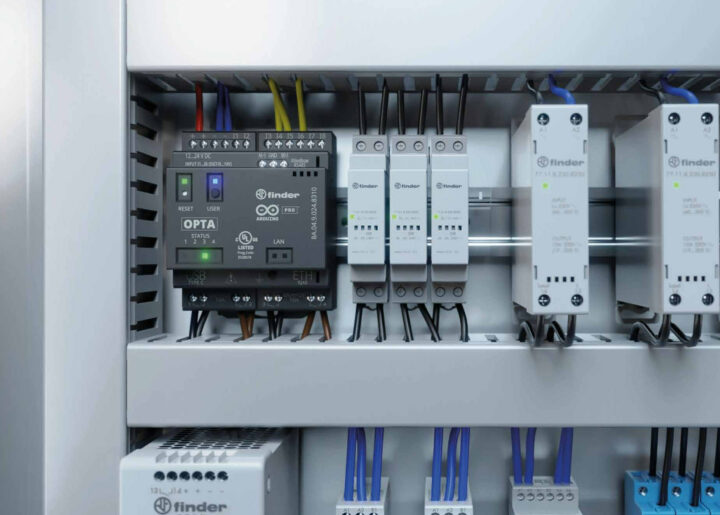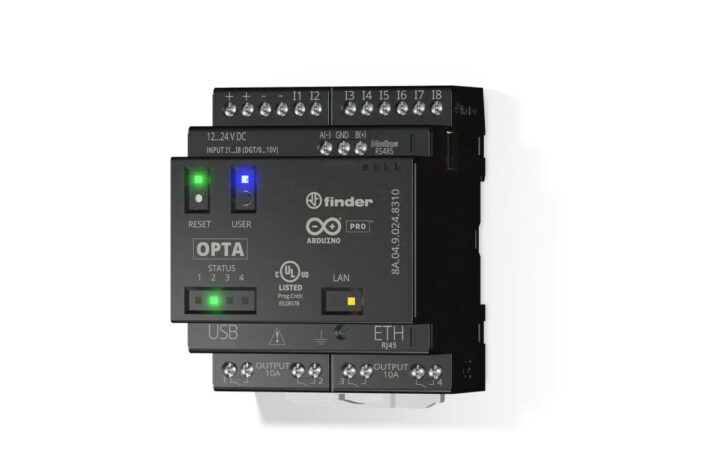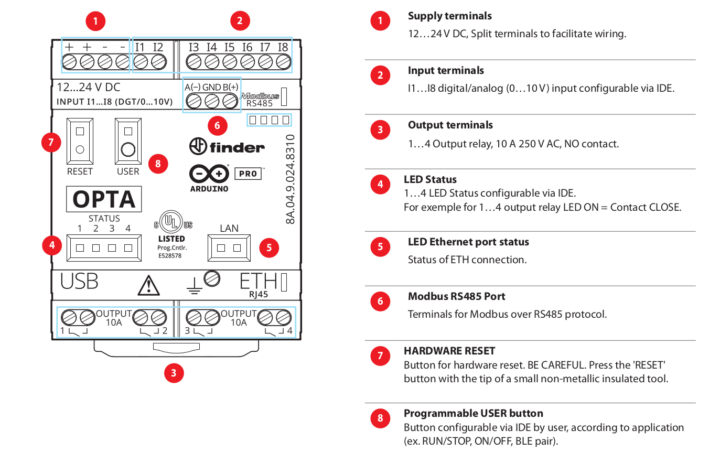Arduino has recently announced the Opta micro PLC with industrial IoT capabilities adding yet another solution to the Arduino Pro family.
Arduino used to focus on the hobbyist crowd, but with the launch of the Arduino Pro family in 2020 starting with the Portenta H7 board, the company switched its main focus to the more profitable enterprise market. Since then they’ve launched several other boards designed in-house, and last year started collaborating with the introduction of the Arduino WisGate Edge LoRaWAN gateways based on RAKwireless hardware. The Arduino Opta is another one of those collaborations as it was designed together with Finder, who calls their devices PLR (Programmable Logic Relays).
Arduino Opta key features and specifications:
- MCU – STMicroelectronics STM32H747XI microcontroller with 1x Arm Cortex-M7 core up to 480 MHz, 1x Arm Cortex-M4 core up to 240 MHz, 2MB flash, 1MB SRAM (as found in all Portenta H7 boards, and I suspect there may be one inside…)
- Storage – 16MB Flash QSPI
- I/Os
- 8x Digital/Analog (0-10V) input
- 4x NO relay output contacts, rated 10 A
- Communication Interfaces
- Ethernet RJ45 port for LAN or MODBUS TCP/IP
- Optional RS485 port for MODUS RTU connection
- Optional WiFi & BLE integrated module
- USB – 1x USB 2.0 Type-C port power, programming, or data logging (via memory stick)
- Security – ATECC608B secure element
- Misc – RTC, Reset and User buttons, various status LEDs for I/Os and Ethernet
- Supply Voltage – 12…24 V DC input
- Dimensions – About 90 x 85 x 69 mm (DIN Rail mountable)
- Weight – 210g
- Ingress Protection – IP20
Three models will be offered: the Opta Lite (8A.04-8300) will all default features, the Opta Plus (8A.04-8310) adding the RS485 ports, and the Opta Advanced (8A.04-8320) with both RS485 and a wireless module for WiFi and Bluetooth LE. The main uses case include industrial automation (Industry 4.0), building automation, and Smart Cities infrastructure,
The micro PLC/PLR supports both traditional PLC languages such as LADDER, FBD, or other IEC/EN 61131 languages that usually require a license and the free Arduino 2.0.0 IDE with a range of open-source libraries. Another advantage of Finder’s partnership with Arduino is support for the Arduino IoT Cloud dashboards for real-time remote monitoring and OTA firmware updates. You’ll find more technical details on Arduino’s documentation page or Finder’s website.

The Arduino Opta was unveiled at SPS Nuremberg 2022 on November 8-10, and pricing is not available yet, and you’ll need to subscribe to a mailing list (or follow CNX Software) to get notified of the launch.

Jean-Luc started CNX Software in 2010 as a part-time endeavor, before quitting his job as a software engineering manager, and starting to write daily news, and reviews full time later in 2011.
Support CNX Software! Donate via cryptocurrencies, become a Patron on Patreon, or purchase goods on Amazon or Aliexpress






